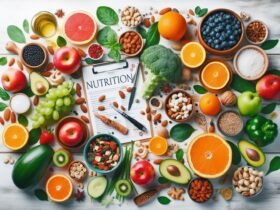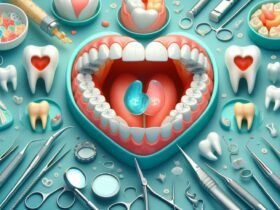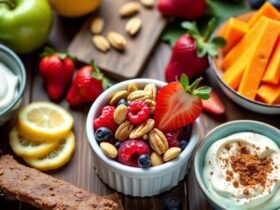Table of Contents
Finding the best diet for men can be tricky, especially for men who have specific health needs. Whether you’re looking to build muscle, manage weight, or just stay healthy, eating the right foods is key. This article will guide you through the best diet plans and tips for men to achieve optimal health.
Key Takeaways
Understanding Nutritional Needs for Men
Macronutrients and Their Importance
Men need a balanced intake of macronutrients to stay healthy. Proteins, carbohydrates, and fats are the main macronutrients. Proteins help build and repair muscles, carbohydrates provide energy, and fats support cell function. It’s important to get these from a variety of foods like lean meats, whole grains, and healthy oils.
Essential Vitamins and Minerals
Vitamins and minerals are crucial for overall health. Men should focus on getting enough vitamins like A, C, D, and E, as well as minerals like calcium, magnesium, and potassium. These nutrients support everything from bone health to immune function. Eating a variety of fruits, vegetables, and dairy products can help meet these needs.
Hydration and Its Role in Health
Staying hydrated is key for maintaining good health. Water helps regulate body temperature, transport nutrients, and remove waste. Men should aim to drink at least 8 cups of water a day, but more if they are active or live in hot climates. Proper hydration can improve energy levels and overall well-being.
A balanced diet and proper hydration are essential for a healthy lifestyle. Make sure to include a variety of foods and drink plenty of water every day.
Top Diet Plans for Men

Choosing the best diet for men can be challenging with so many options available. Here are some top diet plans that cater to different needs and preferences.
Mediterranean Diet
The Mediterranean Diet is often considered the best overall. It emphasizes eating a wide variety of foods: vegetables, fruits, whole grains, nuts, and legumes. This diet encourages the use of olive oil in cooking and suggests moderate amounts of fish and lean poultry for protein. It limits red and processed meats, added sugars, and highly processed foods. This diet is not only heart-healthy but also promotes long-term sustainability.
DASH Diet
The DASH Diet, which stands for Dietary Approaches to Stop Hypertension, is designed to combat high blood pressure. It focuses on foods rich in potassium, calcium, and magnesium while limiting sodium. The diet includes plenty of vegetables, fruits, whole grains, and lean proteins. It’s a great option for those looking to improve heart health.
Flexitarian Diet
The Flexitarian Diet is a flexible, plant-forward diet that allows for occasional meat consumption. It emphasizes plant-based foods like fruits, vegetables, legumes, and whole grains but doesn’t completely eliminate meat. This diet is ideal for those who want to reduce their meat intake without going fully vegetarian.
Paleo Diet
The Paleo Diet focuses on eating foods that were available to our ancestors. This means consuming lean meats, fish, fruits, vegetables, nuts, and seeds while avoiding processed foods, grains, and dairy. It’s a high-protein diet that can be effective for weight loss and muscle building.
For those seeking personalized guidance, online coaching fitness programs can offer tailored advice and support to help you stick to your chosen diet plan.
Diet Tips for Men Over 50
As men age, their nutritional needs change. For men over 50, it’s crucial to focus on a diet that supports overall health and helps prevent common age-related issues like high blood pressure, diabetes, and heart disease. Here are some essential diet tips to keep in mind.
Foods to Include
Incorporating nutrient-rich foods into your diet can make a significant difference. Potassium-rich foods are particularly beneficial as they help counteract the negative effects of sodium and lower blood pressure. Aim to include:
Beans and legumes are also excellent choices. They have a low glycemic index, which means they have minimal impact on blood sugar levels. Add them to salads, burritos, or bowls for a healthy boost.
Foods to Avoid
To maintain optimal health, it’s important to limit the intake of certain foods. Avoiding sugary drinks and processed foods can help you manage your weight and reduce the risk of diabetes and heart disease. Instead, opt for water or unsweetened beverages to stay hydrated.
Managing Portion Sizes
Eating smaller, more frequent meals can help you avoid overeating and keep your metabolism active. Aim for at least three meals a day with healthy snacks in between. This approach can prevent unhealthy food choices when you’re hungry.
Importance of Regular Health Screenings
Regular health screenings are vital for early detection and management of potential health issues. Make sure to schedule routine check-ups with your doctor to monitor your blood pressure, blood sugar levels, and overall health.
Building healthy diet habits can help men over 50 reduce their risk for a variety of health issues. Focus on eating a diet that includes lots of vegetables, fruits, whole grains, low-fat dairy, lean meats, fish, eggs, and nuts.
By following these diet tips, men over 50 can lead a healthier lifestyle and minimize the risk of common health problems.
Building Muscle with the Right Diet
High-Protein Foods
To build muscle, you need to increase your protein intake. Protein is essential because it helps repair and grow muscle tissues. Some great sources of protein include:
Timing Your Meals
When you eat is just as important as what you eat. Consuming protein-rich meals at the right times can maximize muscle growth. Aim to eat a protein-rich meal within two hours after your workout. This helps your muscles recover and grow more efficiently.
Supplements to Consider
Sometimes, your diet alone may not provide all the nutrients you need. Supplements can help fill in the gaps. Consider adding the following to your routine:
Building muscle means more than going to the gym — it means lifting, eating, and resting the right way. Here’s how to build muscle, according to experts.
For more detailed information, you might want to check out the best book on nutrition to guide you further.
Heart-Healthy Diet Choices
Foods That Promote Heart Health
Eating the right foods can help keep your heart in good shape. Fruits and vegetables are key players in a heart-healthy diet. Whole grains, lean meats, and fish are also important. Beans and legumes, like chickpeas and lentils, are great because they have a low glycemic index. This means they don’t spike your blood sugar levels. Including these foods in your meals can make a big difference.
Limiting Sodium and Sugar
Too much sodium and sugar can harm your heart. Try to limit foods that are high in salt, like processed snacks and fast food. Instead, choose fresh options whenever you can. Reducing sugar is also important. This means cutting back on sugary drinks and sweets. Reading food labels can help you make better choices.
Healthy Fats vs. Unhealthy Fats
Not all fats are bad. Healthy fats, like those found in avocados, nuts, and olive oil, can actually help your heart. On the other hand, unhealthy fats, like trans fats and saturated fats, can be harmful. These are often found in fried foods and baked goods. Switching to healthier fats can improve your heart health.
Making small changes in your diet can lead to big improvements in your heart health. Start by adding more fruits and vegetables to your meals and cutting back on salt and sugar. Your heart will thank you!
Weight Management Strategies
Balancing Calories and Activity
To manage your weight, it’s important to balance the calories you eat with the calories you burn. Tracking your progress can help you see how your eating and activity levels affect your weight. Keeping a food diary and tracking your steps are good ways to monitor this balance. Aim for at least 60 minutes of physical activity each week to help with weight loss.
Healthy Snacking Options
Choosing healthy snacks can make a big difference in your weight management journey. Opt for snacks that are high in protein and fiber, like nuts, yogurt, or fruits. These snacks can keep you full longer and help you avoid overeating during meals. Remember, a healthy mindset is key to making better food choices.
Mindful Eating Practices
Mindful eating means paying attention to what and how you eat. This can help you enjoy your food more and prevent overeating. Try to eat slowly, savor each bite, and listen to your body’s hunger cues. This practice can be a part of your holistic health coaching plan and support your overall health and wellness goals.
Making small, gradual changes in your eating habits can lead to long-term success. Think about your personal needs and set realistic goals to stay motivated.
Dietary Considerations for Men with Specific Health Conditions

Diabetes-Friendly Diets
For men managing diabetes, it’s crucial to focus on foods that help control blood sugar levels. Incorporating beans and legumes into your diet can be effective, as they have a low glycemic index. This means they have minimal impact on blood sugar levels. You can easily add them to salads, burritos, or bowls.
Managing High Blood Pressure
To manage high blood pressure, include potassium-rich foods in your diet. Potassium helps counteract the negative effects of sodium and can help relax blood vessels. Aim for about 3,400 milligrams of potassium daily. Foods rich in potassium include greens, mushrooms, peas, tomatoes, oranges, raisins, dates, low-fat milk, yogurt, and fish like halibut or tuna.
Supporting Prostate Health
For prostate health, focus on a balanced and healthy diet. Include at least 2 cups of fruits and 2 and 1/2 cups of vegetables each day for all the essential vitamins, minerals, fibers, and phytochemicals. Whole grains, lean proteins, and healthy fats are also important. Regular health screenings are essential for early detection and management of prostate issues.
Maintaining an active health lifestyle can significantly improve your overall well-being and help manage specific health conditions effectively.
Conclusion
Finding the best diet for men is all about making smart choices that fit your lifestyle and health needs. Whether you’re aiming to boost heart health, manage weight, or simply eat better, there’s a plan out there for you. Remember, the key is to focus on whole, unprocessed foods like fruits, vegetables, lean proteins, and whole grains. Don’t forget to stay active and consult with a healthcare professional before making any big changes. By taking these steps, you can set yourself up for a healthier, happier life.
Frequently Asked Questions
What is the healthiest diet for men?
The healthiest diet for men includes a variety of fruits, vegetables, whole grains, lean proteins, and healthy fats. Diets like the Mediterranean, DASH, and Flexitarian are often recommended by experts.
Which diet is best for weight loss?
A good weight loss diet focuses on replacing unhealthy foods with healthier options. It should include a balance of fruits, vegetables, lean proteins, and healthy fats while being low in sugar and salt.
What foods should men over 50 include in their diet?
Men over 50 should include potassium-rich foods like greens, mushrooms, and fish, as well as other nutrient-dense options such as fruits, vegetables, whole grains, and lean proteins.
What diet helps build muscle?
To build muscle, a diet rich in protein is essential. This includes consuming foods like lean meats, fish, eggs, dairy, beans, and legumes.
How can men maintain a heart-healthy diet?
A heart-healthy diet includes foods rich in fiber, healthy fats, and lean proteins. It’s important to limit sodium, sugar, and unhealthy fats. Foods like fruits, vegetables, whole grains, and fish are great choices.
What should men with diabetes eat?
Men with diabetes should focus on a diet low in added sugars and high in vegetables, fruits, whole grains, lean proteins, and low-fat dairy. Avoiding high sodium and saturated fats is also important.













Follow Me